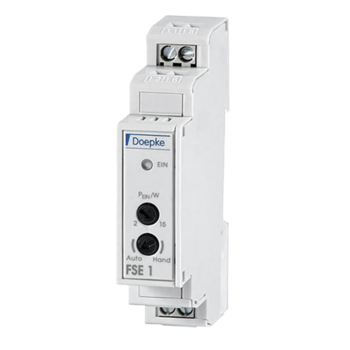mains field relays FSE 1


Details
Mains field relays, 1 NO, 230 V AC, 16 A
Mains field relays, also known as mains disconnectors, disconnect an electric circuit once the last connected consumer has been switched off. As soon as the first consumer is switched on, they switch the mains voltage back on. Mains field relays protect against the possible health effects of electrical magnetic fields. The switch-on threshold for the FSE 1 is adjustable from 2 W to 15 W. This allows the option of muting "idle loads", identified by long or poorly insulated cables, for example, and preventing a conditional continuous switch-on of the FSE 1. The switch-off power is approx. 2/3 of the set switch-on power. The rotary switch can be used to choose between automatic and continuous-on operation ("manual"). The switch-on status is indicated with an LED. Some consumers require a start voltage equal to the mains voltage for a switch-on. These consumers are brightness controllers, speed-regulated drills, fluorescent and energy-saving lamps, for example. To ensure a reliable switch-on of the mains field relay in this case, the PTC base load element FS-GE and the base load adaptor plug FS-GZ are available.
adjustable switch-on power of 2 VA to 15 VA, rotary switches for automatic and continuous-on operation, front LED as switch position indicator, low internal consumption, robust NO relay, 230 V/16 A, module width just 1 unit (17.5 mm), protection class IP20
quick fastening to mounting rail, any installation position
The use of the mains field relay is recommended anywhere where electrical interference fields are undesired or dissipation power from standby functions should be prevented. Recommended places in particular are private and commercially used buildings with consumers that are not used over a longer timeframe (lighting, audio/video components, machines, etc.)
Mains field relays, 1 NO, 230 V AC, 16 A
Mains field relays, also known as mains disconnectors, disconnect an electric circuit once the last connected consumer has been switched off. As soon as the first consumer is switched on, they switch the mains voltage back on. Mains field relays protect against the possible health effects of electrical magnetic fields. The switch-on threshold for the FSE 1 is adjustable from 2 W to 15 W. This allows the option of muting "idle loads", identified by long or poorly insulated cables, for example, and preventing a conditional continuous switch-on of the FSE 1. The switch-off power is approx. 2/3 of the set switch-on power. The rotary switch can be used to choose between automatic and continuous-on operation ("manual"). The switch-on status is indicated with an LED. Some consumers require a start voltage equal to the mains voltage for a switch-on. These consumers are brightness controllers, speed-regulated drills, fluorescent and energy-saving lamps, for example. To ensure a reliable switch-on of the mains field relay in this case, the PTC base load element FS-GE and the base load adaptor plug FS-GZ are available.
adjustable switch-on power of 2 VA to 15 VA, rotary switches for automatic and continuous-on operation, front LED as switch position indicator, low internal consumption, robust NO relay, 230 V/16 A, module width just 1 unit (17.5 mm), protection class IP20
quick fastening to mounting rail, any installation position
The use of the mains field relay is recommended anywhere where electrical interference fields are undesired or dissipation power from standby functions should be prevented. Recommended places in particular are private and commercially used buildings with consumers that are not used over a longer timeframe (lighting, audio/video components, machines, etc.)
